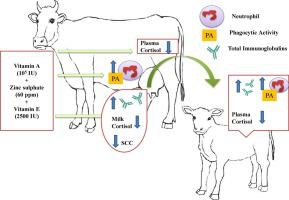Journal of Trace Elements in Medicine and Biology ( IF 3.6 ) Pub Date : 2021-01-14 , DOI: 10.1016/j.jtemb.2021.126718 Mohanned Naif Alhussien 1 , Sadhana Tiwari 2 , Bibhudatta Samanta Kumar Panda 3 , Yogesh Pandey 3 , Surender Singh Lathwal 2 , Ajay Kumar Dang 3

|
Background
Periparturient period induces stress in cows which fluctuates hormonal and metabolic function and causes immune suppression. Apart from impairing the health, production, and reproduction of cows, it also influences the well-being of newborn calves by decreasing the colostrum quality. Micronutrients are known for optimal health and production and their effects on parturition stress, immune response in both cow and its calf need to be explored.
Aim
The aim of this study was to see the effect of oral supplementation of micronutrients during the prepartum period on the health status of crossbred dairy cows and subsequently on their newborn calves.
Methods
A total of 42 healthy multiparous cows were selected and randomly divided into five groups with seven cows in each group, i.e. control (Basal Diet, BD), VA group (BD + vitamin A, 105 IU), Zn group (BD + zinc sulphate, 60 ppm), VE group (BD + vitamin E, 2500 IU), and combined supplementation (CS) group (BD + combination of VA, Zn, and VE). The supplements were offered in compounded concentrate DM (100 g) to individual cows once daily before the morning feeding and the remaining portion was incorporated in the TMR. Feeding was started one month before the expected days of calving till calving. Blood samples were collected from cows at days -15, -7, -3, 0, +3, +7, and +15 relative to the day of calving. Blood samples from newborn calves and milk samples of cows were collected at days 0, +3, +7, and +15. Milk somatic cell counts (SCC) were estimated using a cell counter. Cortisol was estimated by ELISA kit in blood and milk plasma of cows and in the blood plasma of their calves. Total immunoglobulins (Ig) were estimated in milk of cows and serum of calves using zinc sulphate turbidity method. Blood neutrophils from cows and calves were studied for phagocytic activity (PA) using nitro blue tetrazolium (NBT) assay.Data were analysed by repeated-measures two-way ANOVA using the mixed procedure of SAS, and the pairwise comparison was performed using a multiple comparison test (Tukey).
Results
Combined supplementation of micronutrients decreased (P < 0.05) maternal blood plasma (control vs. CS group, 5.98 ± 0.20 vs. 3.86 ± 0.23 ng/mL) and milk plasma (3.96 ± 0.13 vs. 2.71 ± 0.10 ng/mL) cortisol, milk SCC (3.05 ± 0.11 vs. 2.12 ± 0.10 × 105 cells/mL) and increased (P < 0.05) total milk Ig concentration (18.80 ± 0.11 vs. 23.04 ± 0.57 mg/mL) and the PA of blood neutrophils (0.84 ± 0.03 vs. 1.07 ± 0.03). Similarly, lower blood cortisol concentration (9.69 ± 0.35 vs. 6.02 ± 0.18 ng/mL) and higher (P < 0.05) total Ig (23.26 ± 0.11 vs. 30.34 ± 0.70 mg/mL) and PA of blood neutrophils (0.37 ± 0.02 vs. 0.52 ± 0.02) were observed in the calves born to CS group of cows as compared to the control. Highest (P < 0.05) positive effects (lower stress levels and higher immune response) of treatment were noticed in CS group followed by VE group and then Zn group. However, VA group didn’t differ from the control group.
Conclusion
Our results indicate that micronutrient interventions during the prepartum period can improve the health status of dairy calves and subsequently the well-being of their calves.
中文翻译:

补充抗氧化微量营养素可减轻围产期奶牛及其犊牛的压力并改善免疫功能/反应
背景
围产期会引起奶牛的压力,从而使荷尔蒙和代谢功能发生波动并导致免疫抑制。除了损害奶牛的健康、生产和繁殖外,它还通过降低初乳质量影响新生犊牛的健康。微量营养素以最佳的健康和生产而著称,它们对分娩压力、奶牛及其小牛的免疫反应的影响需要探索。
目的
本研究的目的是观察在产前阶段口服补充微量营养素对杂交奶牛及其新生犊牛健康状况的影响。
方法
选取健康经产奶牛42头,随机分为5组,每组7头,即对照组(基础日粮,BD),VA组(BD+维生素A,10 5IU)、Zn 组(BD + 硫酸锌,60 ppm)、VE 组(BD + 维生素 E,2500 IU)和联合补充剂 (CS) 组(BD + VA、Zn 和 VE 的组合)。每天早晨喂食前一次以复合浓缩 DM(100 克)的形式向个别奶牛提供补充剂,其余部分加入 TMR。在预计产犊天数前一个月开始饲喂直至产犊。在相对于产犊日的第 -15、-7、-3、0、+3、+7 和 +15 天从奶牛收集血液样本。在第 0、+3、+7 和 +15 天收集新生小牛的血液样本和奶牛的牛奶样本。使用细胞计数器估计牛奶体细胞计数 (SCC)。皮质醇通过ELISA试剂盒在奶牛的血液和牛奶血浆中以及它们的小牛血浆中进行估计。使用硫酸锌浊度法估计奶牛和小牛血清中的总免疫球蛋白 (Ig)。使用硝基蓝四唑 (NBT) 测定法研究奶牛和小牛血液中性粒细胞的吞噬活性 (PA)。使用 SAS 的混合程序通过重复测量的双向 ANOVA 分析数据,并使用多重分析进行成对比较。比较测试(Tukey)。
结果
微量营养素的联合补充降低 (P < 0.05) 母体血浆(对照组与 CS 组,5.98 ± 0.20 与 3.86 ± 0.23 ng/mL)和乳血浆(3.96 ± 0.13 与 2.71 ± 0.10 ng/mL)皮质醇,牛奶 SCC(3.05 ± 0.11 vs. 2.12 ± 0.10 × 10 5细胞/mL) 和增加 (P < 0.05) 总牛奶 Ig 浓度(18.80 ± 0.11 对 23.04 ± 0.57 毫克/毫升)和血液中性粒细胞的 PA(0.84 ± 0.03 对 1.07 ± 0.03)。同样,较低的血液皮质醇浓度 (9.69 ± 0.35 与 6.02 ± 0.18 ng/mL) 和更高 (P < 0.05) 的总 Ig (23.26 ± 0.11 与 30.34 ± 0.70 mg/mL) 和血液中性粒细胞的 PA (0.327 ± 0)与对照相比,在 CS 组奶牛所生的小牛中观察到了 0.52 ± 0.02)。在 CS 组中观察到最高 (P < 0.05) 的积极作用(较低的压力水平和较高的免疫反应),其次是 VE 组,然后是 Zn 组。然而,VA组与对照组没有区别。
结论
我们的结果表明,产前阶段的微量营养素干预可以改善奶牛犊的健康状况,进而改善犊牛的健康状况。











































 京公网安备 11010802027423号
京公网安备 11010802027423号